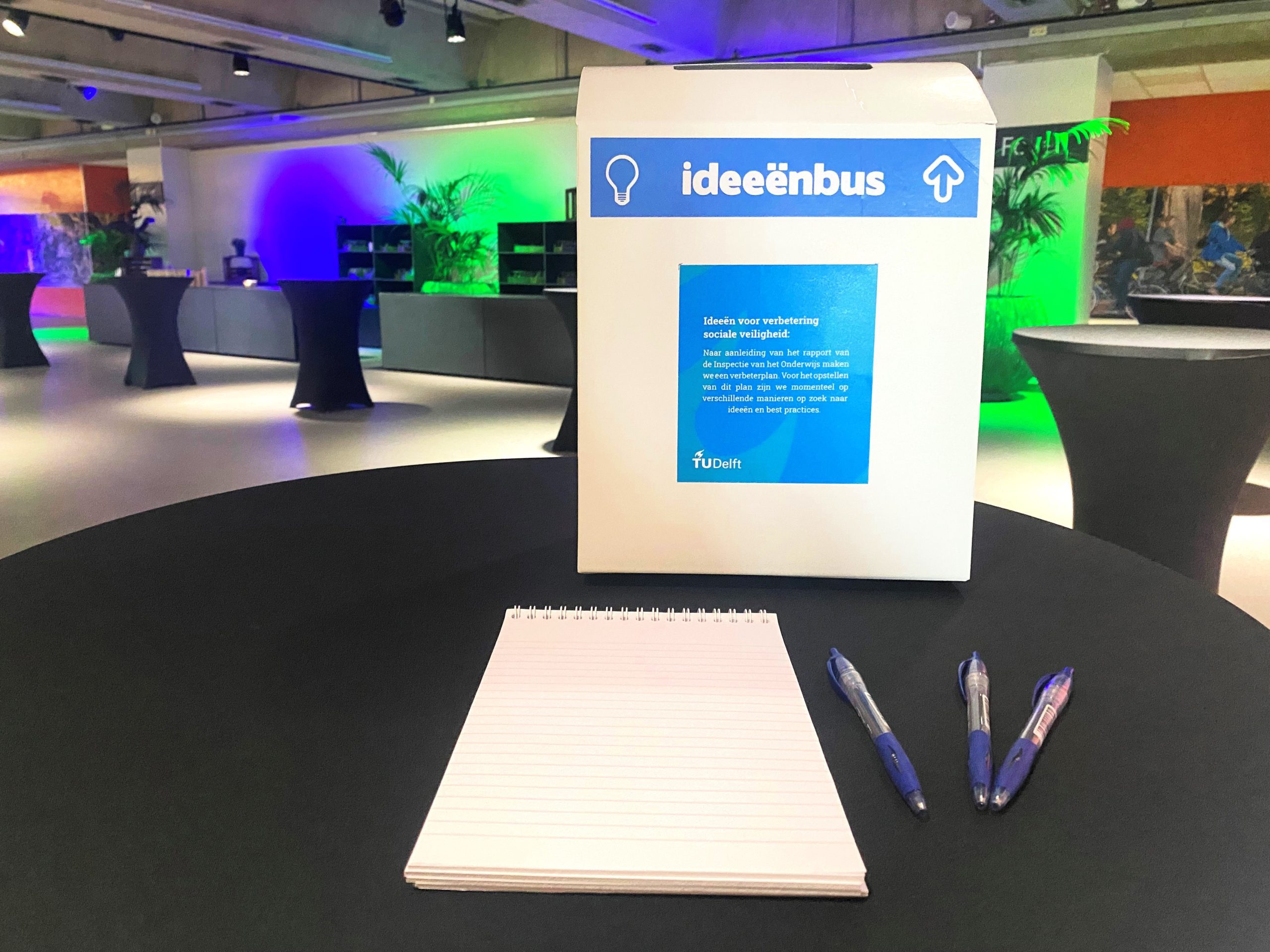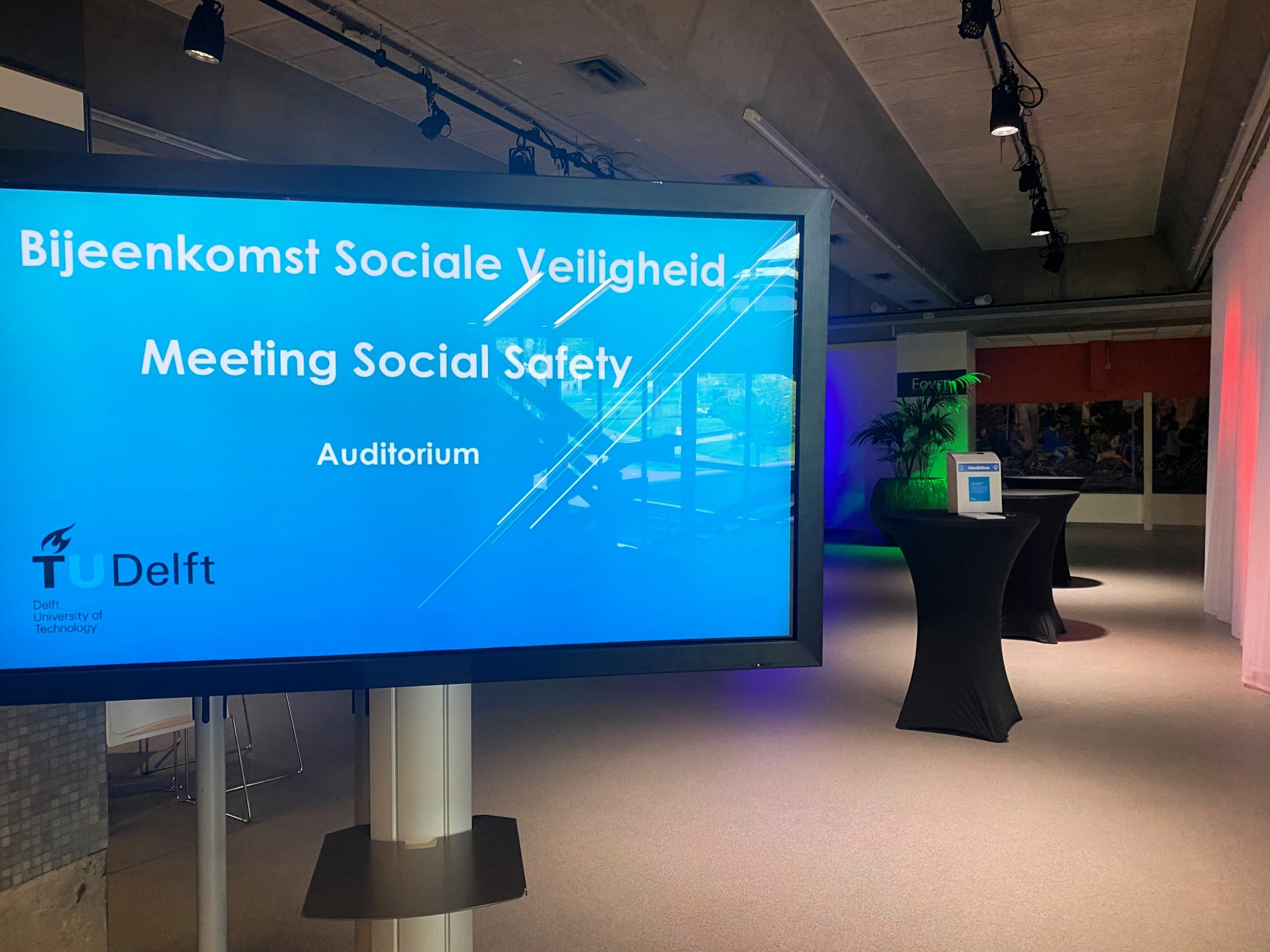Staff members, students and alumni talked about problems around social safety at four meetings. The moderators hoped for solutions, but it appeared that they had difficulties with the process.
(Photo: Annebelle de Bruijn)
The Executive Board held the four meetings on social safety to find out ‘what needs to change and how this can best be done in the eyes of the TU Delft community’. It hired the Berenschot consultancy firm to facilitate the discussions and process the input. With the help of Mentimeter quizzes, small group discussions, and plenary discussions held during the process, ideas were to be collected for the social safety action plan that TU Delft has to present to the Inspectorate of Education by mid-May.
Instead of ideas for solutions, what emerged were anger and frustration. The people present talked about their experiences with anti-social behaviour and were occasionally very critical about what they see as a lack of recognition on this. Some also condemned the actions and decisions made by the Executive Board since the report was published on 1 March.
‘People do not have confidence in this process’
That frustration was expressed at the third meeting (on Monday 15 April) in the presence of the Chair of the Supervisory Board, Tijo Collot d’Escury, and one of its members, Manon van Beek. In answer to the Mentimeter question of ‘What does social safety at TU Delft mean to you?’, not only did ‘respect’ and ‘action’ appear in the middle of the word cloud on the screen, but also ‘Executive Board resignation’, ‘consequences’ and ‘accountability’.
Powerful message
Then Carin van der Hor, external Confidential Advisor at TU Delft, spoke. She advised the Berenschot moderators to really listen to what was being said in the hall. “People do not have confidence in this process. We can come up with as many solutions as we want, but if there is no trust in the process or the management, it will not work.” Van der Hor was applauded for this by an otherwise quiet audience.
“A powerful message,” said the moderator. He was quiet for a bit and then asked the 75 people present how they wanted the meeting to proceed. “We can stop now, but I do not think that would be good option as we very much want to hear from you.” A group discussion with everyone present then followed. The two moderators walked around the hall with microphones so that anyone wishing to do so, may speak.
Some people used the opportunity to suggest solutions for the action plan. One person suggested that it must be ensured that administrators in a democratic system take accountability. Not only talk, but really take action, said another.
Most comments were about the process. It seemed that the speakers have little faith in the management taking the problem seriously, and certainly as the Executive Board and the Supervisory Board threatened to take the Inspectorate of Education to court. The outcomes of the process should be binding and it should be set up more democratically, they said.
Only to listen
For the Supervisory Board members present, the meeting went differently than planned. Officially – as was announced – they were only there to listen, but they received questions from the audience. “The Executive Board has overturned its decision to take legal action, but has the Supervisory Board also done this?” was one question.
Chair Collot d’Escury answered the question by confirming that the Supervisory Board believes that the initial response was wrong. “We tried to send two messages. Yes, social safety is very important and everyone, not only staff members, but students as well, deserves a safe place. The other side of the coin – and to protect other universities in the future – is that we see that the investigation was not done properly.” Collot d’Escury offered his apologies. “We had the best communications advisors to bring across this message, but it clearly did not work and was a mistake.”
Apologies
The option of holding a plenary discussion, which emerged on 15 April after the Confidential Advisor intervened, also appeared to have been chosen the following day. While the staff members, students and alumni ate their lunch in silence, the three Board members used the introduction to extend their apologies.
‘This is not how we deal with each other’
Rector Tim van der Hagen said “First, we do not have a proper understanding that social safety is not in order at TU Delft. Many people feel unsafe or unfairly treated. This goes for students, for staff members and for guests.” He said that the Inspectorate report was a ‘wake-up call’ for the Executive Board. He also admitted that the Executive Board did not handle the communications well after that, which was painful for people. He sees that there is long road ahead to improve the situation. “Not just to satisfy the Inspectorate, but because we think it is important ourselves.”

Vice-Rector Magnificus Rob Mudde also offered his apologies on behalf of the Executive Board. One day prior to the meeting, the Legal Services forced Delta to take an article offline which led to a flood of outraged responses from both inside and outside TU Delft. This should not have happened, said Mudde. “Delta and its Editorial Office decide on what they write. This may include items that feel like a kick to my shins, but in the Netherlands that is the right and the duty of journalists”. The Executive Board will not interfere with the freedom of the press, he stresses. Van der Hagen adds “I found the email to Delta very unpleasant. I would not be able to sleep if I received an email like that. This is not how we deal with each other.”
Behaviour among colleagues
Executive Board member Marien van der Meer then said that the stories of the bad experiences that were shared with the Inspectorate and reached the Executive Board came from across TU Delft and did not just involve supervisors. “They also involved pain caused by certain behaviour among colleagues. They were not only male colleagues, but female colleagues too. And they were not only within academic teams, they also came from the University Services and everywhere in between.” She expressed her regret that the Executive Board had not paid attention to this earlier, despite reports from the confidential advisors and others.
‘A change in culture starts with mutual trust’
When the open discussion started after the introduction, it appeared that the apologies did not go far enough for everyone. The alumnus that first spoke said that he had learned the skill of analysing at TU Delft, but did not see this reflected in the process. “If you do not analyse the problem, I doubt that you will get very far.” One staff member said she sees a large gap between the words and the actions of the Board. She said that the words may sound like recognition, but that she saw more of an attitude of ‘fighting while going under’ in the action.
Opportunity
The attendees also said that the position of the management towards the Delta Editorial Office does not help the process either. It ‘creates feelings of a lack of safety rather than taking them away’. Various staff members said that this makes it not yet the right time to talk about a plan of action. One person said “I find it hard while the incidents continue to pile up. How can we look ahead when we are in the middle of yet another incident?”
Other people present did have confidence in how the Board is handling things. As ‘an outsider’, one alumnus said he does not doubt the words of the Executive Board. He believes that the Board members are the right ones to lead the changes needed as they drastically changed their opinion recently. “I would say that we should give them a chance. A change in culture starts with mutual trust.”
Another person viewed the focus on the Executive Board as misplaced. That person said that “I see social safety as something that involves every one of us, and in that case the question should be what has each one of us done and can we do it better tomorrow?”
Shifting deadline
During and after the last two meetings, it turned out that some people present found the plenary arrangement difficult. “I do want to speak, but I am amid people that I do not know and I cannot see,” expressed one person who felt uncomfortable. “I am nervous to speak as I do not know if I am using the right words and whether they will be taken as well intentioned by others,” said another. Some of the people present also spoke of feeling uncomfortable in small group discussions, some of which Executive Board members joined.
In any case, Executive Board member Van der Meer says that there is a need “to handle the process more calmly”. She says that the Executive Board is looking at whether the deadline for the action plan can be pushed back, “but whether the Inspectorate will accept this or not is up in the air”.
The meetings attracted these amounts people: about 40 at the first one on 10 April; about 75 at the second and third ones (both on 15 April); and more than 130 people at the meeting with the Executive Board (16 April). At the end, Rector Van der Hagen announced that in the time to come the Executive Board will enter into discussions within the faculties and other parts of the organisation. Input (anonymously if desired) may still be submitted to the digital suggestion box.
Do you have a question or comment about this article?
E.S.Beinema@tudelft.nl


Comments are closed.